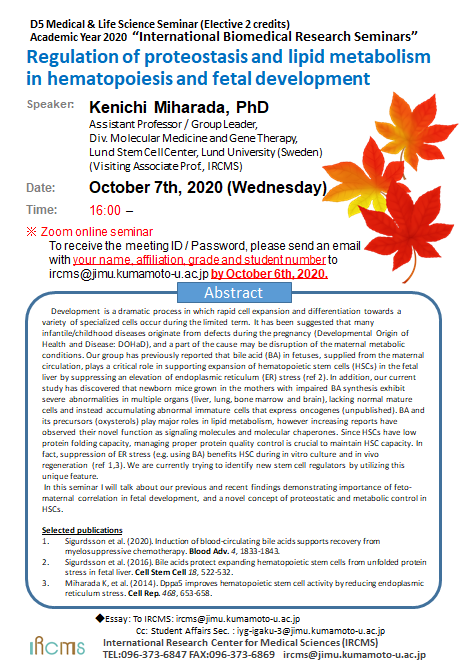- HOME
- News & Events
- [Oct.7] D5 Medical & Life Science Seminar-Dr. Kenichi Miharada
News & Events
[Oct.7] D5 Medical & Life Science Seminar-Dr. Kenichi Miharada
September 23 2020
The "D5 Medical & Life Science Seminar" course will be offered by International Research Center for Medical Sciences (IRCMS). It will run from April 2020 to March 2021, with lectures given by scientists who are affiliated with IRCMS or in collaboration with researchers at IRCMS. The lectures will be given once a month, in English, and by leading scientists in the relevant research field. Students will be taught: 1) how normal physiological functions are maintained in the human body; 2) how these systems become abnormal under certain pathophysiologic conditions; 3) why stem cells are important in animal development and homeostasis; 4) how stem cell-based approaches can help us understand disease mechanisms and find potential cure for diseases related to stem cell malfunction (e.g., cancer, aging).
Date : October 7, 2020 (Wednesday)
Time : 16:00 -
* Zoom online seminar
To receive the meeting ID / Password, please send an email to
ircms@jimu.kumamoto-u.ac.jp by October 6, 2020.
Please include your name, affiliation, grade and student number in your email.
Speaker : Kenichi Miharada, PhD
Assistant Professor / Group Leader,
Div. Molecular Medicine and Gene Therapy, Lund Stem Cell Center,
Lund University (Sweden)
(Visiting Associate Professor, IRCMS)
Title : Regulation of proteostasis and lipid metabolism in hematopoiesis and fetal development
Abstract :
Development is a dramatic process in which rapid cell expansion and differentiation towards a variety of specialized cells occur during the limited term. It has been suggested that many infantile/childhood diseases originate from defects during the pregnancy (Developmental Origin of Health and Disease: DOHaD), and a part of the cause may be disruption of the maternal metabolic conditions. Our group has previously reported that bile acid (BA) in fetuses, supplied from the maternal circulation, plays a critical role in supporting expansion of hematopoietic stem cells (HSCs) in the fetal liver by suppressing an elevation of endoplasmic reticulum (ER) stress (ref 2). In addition, our current study has discovered that newborn mice grown in the mothers with impaired BA synthesis exhibit severe abnormalities in multiple organs (liver, lung, bone marrow and brain), lacking normal mature cells and instead accumulating abnormal immature cells that express oncogenes (unpublished). BA and its precursors (oxysterols) play major roles in lipid metabolism, however increasing reports have observed their novel function as signaling molecules and molecular chaperones. Since HSCs have low protein folding capacity, managing proper protein quality control is crucial to maintain HSC capacity. In fact, suppression of ER stress (e.g. using BA) benefits HSC during in vitro culture and in vivo regeneration (ref 1,3). We are currently trying to identify new stem cell regulators by utilizing this unique feature.
In this seminar I will talk about our previous and recent findings demonstrating importance of feto-maternal correlation in fetal development, and a novel concept of proteostatic and metabolic control in HSCs.
Selected publications
- Sigurdsson et al. (2020). Induction of blood-circulating bile acids supports recovery from myelosuppressive chemotherapy. Blood Adv.4, 1833-1843.
- Sigurdsson et al. (2016). Bile acids protect expanding hematopoietic stem cells from unfolded protein stress in fetal liver. Cell Stem Cell18, 522-532.
- Miharada K, et al. (2014). Dppa5 improves hematopoietic stem cell activity by reducing endoplasmic reticulum stress. Cell Rep.468, 653-658.

